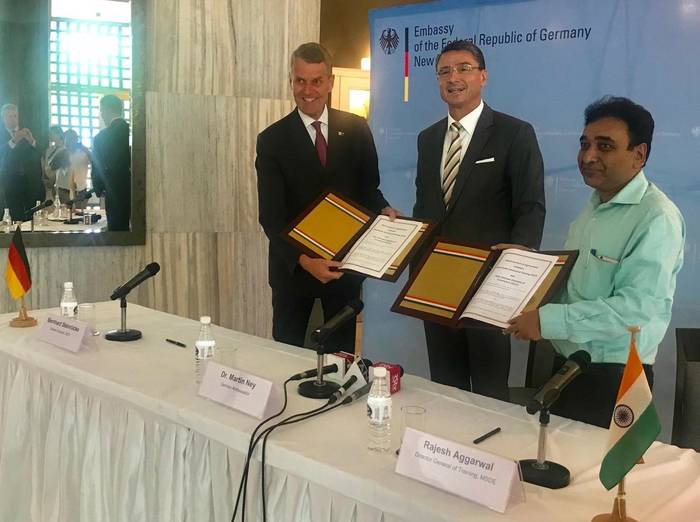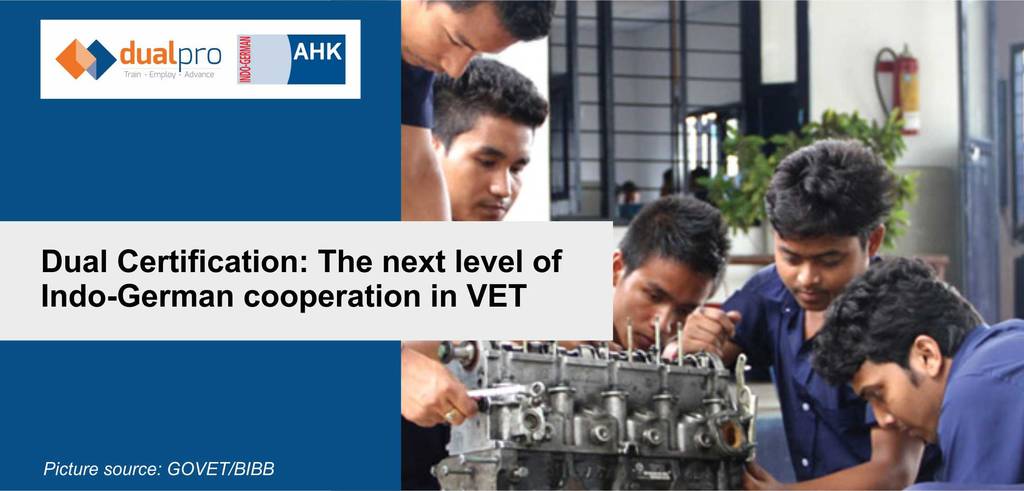 As India looks to enhance the quality of skill development, government and industry bodies are increasingly looking towards the German model of dual vocational training. And for a good reason: With its action-oriented learning approach, the integration of the two learning locations of school and company, the emphasis on trainer qualification and on high-level industry-involvement, trainees are ensured to have not only an in-depth knowledge of their domain, but the latest, job and industry relevant skills.
As India looks to enhance the quality of skill development, government and industry bodies are increasingly looking towards the German model of dual vocational training. And for a good reason: With its action-oriented learning approach, the integration of the two learning locations of school and company, the emphasis on trainer qualification and on high-level industry-involvement, trainees are ensured to have not only an in-depth knowledge of their domain, but the latest, job and industry relevant skills.
Employers also benefit from dual VET: They are able to ensure that they always have enough skilled workers at hand and are able to partially adapt the training to the special need of their company.
With the objective of transferring the success formula, various German players have been active in the Indian market, advising government agencies, collaborating with representations of entire industries or supporting individual companies in achieving their skilling goals. They aim to make an important contribution to improving training quality and thus the employability of training graduates. Yet, for private initiatives, candidates often complete such programs with a certificate issued by a private organisation instead of a government recognised qualification.
However, a recognised qualification is often a requirement, most importantly. for government jobs or international career opportunities. In such cases, the lack of a recognised formal qualification restricts the access to such opportunities. If they wish to obtain a formal recognition based on their skill level, they will have to undergo an additional examination or course.
Dual certification as a solution
This is the starting point for the dual certification project, sponsored by the German Federal Ministry of Education and Research (BMBF) and implemented by the Indo-German Chamber of Commerce (IGCC) and in close cooperation with the Directorate General of Training (DGT). The project aims to develop a concept for dual training courses which correspond to the requirements of both the Indian and German vocational education system.
In the dual certification scenario, trainees would have to take a single, joint examination in order to receive two certificates, one from India and one from Germany. This saves trainees valuable time, resources and effort which would be required for appearing for an additional examination or even course.
On top of this, dual certification also serves the important purpose of quality assurance. While trainees can obtain two certificates through a single examination, the programmes leading to the exam still need to adhere to the requirements of both regulating Indian and German bodies.
When implementing dual vocational training abroad, the German Chambers of Commerce Abroad (AHKs) follow a set of quality standards defined by the Association of German Chambers of Commerce and Industry (DIHK). As the DIHK controls dual vocational training in Germany, these international standards are directly based on the German dual vocational education system, thus ensuring not only high training quality for German dual training abroad, but also a consistency between locally adapted training programs worldwide.
Considering a dual certification scenario in India, these DIHK standards will particularly affect dual training programs with regards necessary trainer qualification, training approach and the proportion of practical learning. For example, trainers not only need to prove their hands-on experience in their trade, they also need to be certified through the Ausbildung der Ausbilder – International, a flagship trainer qualification concept emphasising the approach, process and methodology of German dual training. Further, 70% of the course needs to be imparted through practical learning on the job, making industry participation a key aspect of the training programmes.
GIIVETs as a hybrid model between German and Indian VET
One model proposed by Dr K P Krishnan, Former Secretary at the Ministry of Skill Development and Entrepreneurship, concerns the establishment of German Indian Institutes for Vocational Education and Training (GIIVETs). The signing of a Memorandum of Agreement between the Directorate General of Training (DGT) and the IGCC in August 2018 lay the foundation for realising this idea.
 A picture from the archives: Mr. Rajesh Aggarwal, Former Director General of Training at the MSDE, Dr Martin Ney, Former Ambassador to the Federal Republic of Germany in India, and Mr. Bernhard Steinrücke, Director General of the IGCC sign the MoA on the Establishment of GIIVETs
A picture from the archives: Mr. Rajesh Aggarwal, Former Director General of Training at the MSDE, Dr Martin Ney, Former Ambassador to the Federal Republic of Germany in India, and Mr. Bernhard Steinrücke, Director General of the IGCC sign the MoA on the Establishment of GIIVETs
The GIIVET framework takes strong reference to the German structure of dual vocational training, where most technical professions are trained over a duration of 3.5 years. In order to assess the learning of trainees, they need to appear for a final examination, which is conducted in two parts: Part 1 after two years of training and Part 2 after the completion of the full training duration.
In each of these examinations, trainees need to demonstrate both subject matter expertise as well as the ability to plan a designated project, implement it and check the quality of their own work.
- As the hybrid of both the German and Indian VET system, GIIVETs would first train apprentices in a particular trade for a duration of two years, after which they appear for part one of the German final examination, adapted to India.
- On successful completion, they receive an NCVT certificate at NSQF level 5 as well as an IGCC-DIHK certificate of category B (Local dual vocational training based on the German model).
- Trainees who wish to continue their education will be trained for another 1-1.5 years preparing them for the locally adapted part two of the German final examination.
- Through this, they will be able to obtain both the higher level NCVT certificate and an IGCC-DIHK certificate of category A (German dual training abroad). Whether institutes selected as GIIVETs follow these standards will be monitored by the GIIVET committee, a body consisting of representatives from DGT and IGCC.
Work in progress
While the committee is currently in discussions about the details of the project, a lot of ground work has already been done. In order to select suitable institutes to offer dual certification programmes, the GIIVET committee have developed a first draft for Affiliation Norms. Further, it has developed sample curricula for the trades of electrician, fitter, machinist, mechatronics technician and tool and die mechanic in order to verify the feasibility of curricula that meet the requirements of both the Indian and German regulatory bodies. Various institutes across India have already expressed their interest in becoming a GIIVET.
Until the first GIIVET can open its doors for the first batch of trainees, further steps need to be taken, including securing the involvement of relevant industries. However, while it is currently the most pursued approach to the dual certification, it remains to be only one solution. In order to ensure that dual certification is implemented, it is beneficial to explore further avenues with various other government and private agencies. One thing is clear: With its benefits for everyone involved, dual certification is the need of the hour.
For questions related to the dual certification project, reach out to the Indo-German Chamber of Commerce (dualpro@indo-german.com or +91 (0)20 41047 -114 | -118)
To learn more about Indo-German cooperation in Vocational Education and Training along with details of current initiatives, visit https://nationalskillsnetwork.in/govet-germany/














We sister Hatune Foundation is a subsidiary NGO of Hatune Foundation Germany. We have CA campus with all facilities in Kuttanadu Kerala India. Can we participate in vocational training for Indian youth to work them in Germany. Pl advise